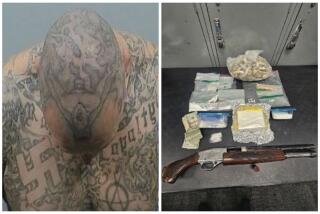2,000 Protest Alleged U.S. Role in Crack Influx
- Share via
In an outpouring of anger over a controversy rapidly gaining velocity in Los Angeles’ African American community, about 2,000 people converged on the Crenshaw district Saturday to demand that U.S. government officials be held accountable for alleged complicity in the city’s deadly scourge of crack cocaine.
The emotional crowd was drawn to the event, co-sponsored by the Congressional Black Caucus and black-owned radio station KJLH-FM (102.3), by publicity surrounding a recent series of articles in the San Jose Mercury News.
The paper claimed that two Nicaraguan drug dealers, who helped finance the U.S.-backed Contra war in the 1980s, also opened the door for the epidemic of crack and gang violence that has ravaged South-Central Los Angeles.
The gathering gave an outlet to a wave of grass-roots rage not seen since the days of the Rodney G. King beating and the civil unrest that followed, some participants said.
“People in high places were winking and blinking, and our children were dying,” Rep. Maxine Waters (D-Los Angeles), who helped organize the rally, told the crowd.
Brotherhood Crusade leader Danny Bakewell brought the entire, cheering audience to its feet, thundering into the microphone: “You [the government] gave them this dope to commit the crimes you want to punish them for. We want [those responsible] prosecuted, and we want them to go to jail.”
Who “they” are, and whether the CIA directed or knew of drug sales, remains an open question. Some critics have taken issue with the Mercury News series, saying that it fell short of proving its incendiary central thesis. Still, the firestorm raised by the alleged CIA-crack connection has prompted federal and congressional investigations.
Few at Saturday’s gathering, which filled a huge auditorium and spilled outside, forcing police to close off a street, needed any more convincing. Professionals, retirees, college students, homemakers and blue-collar workers--many had seen the devastation of crack cocaine in their families or neighborhoods. And the Mercury News report only served as “mainstream” confirmation of what many African Americans have long believed--that only the U.S. government had the power to ensure that such massive quantities of drugs could flow so freely into the country.
David Cooper, a 31-year-old paralegal, suggested that the alleged government links to drug dealing are part of a larger scheme of “social engineering” by the government. Noting that a disproportionately large number of blacks are serving prison sentences on drug charges, he said: “Is it a war on drugs or a war on black people?”
One after another, politicians vowed to seek the answers.
“We have to get to the bottom of
what happened in the 1980s. Who was financing these drugs coming into the United States?” asked Los Angeles County Supervisor Yvonne Brathwaite Burke, who has joined the call for federal probes.
But for many, the only questions remaining were who would be punished and when, as well as what form U.S. government restitution to African American communities should take.
Some suggested reparations to families harmed by crack, others that babies suffering the effects of crack addiction at birth be taken care of for the rest of their lives. Community activists said new federally funded programs for young people should be demanded.
Superior Court Judge Roosevelt Dorn, comparing the crack epidemic to “a hydrogen bomb dropped on South-Central Los Angeles,” called on the crowd to “solve our own problems,” by taking responsibility for children and families. “But it takes jobs, jobs, jobs,” he said.
Some speakers suggested that convicted drug dealer “Freeway” Ricky Ross, a South-Central cocaine kingpin who allegedly purchased drugs from the Contra suppliers in the 1980s, may have been singled out for unfair prosecution.
They noted that those allegedly supplying him served little or no time in prison--and one went on the federal Drug Enforcement Administration payroll as an informant. But that seemed to draw a mixed response. “Ross. He isn’t any good. I’m not going to praise him. His ass is in jail, which is where he needs to be,” said Otho Day, 38, a county government official who attended the rally.
It appeared Saturday that the controversy is only beginning to gather steam. A candlelight vigil is planned Thursday night outside the Martin Luther King Jr./Drew Medical Center, and Bakewell and other speakers talked of marches on federal buildings.
Waters’ staff distributed thousands of copies of the Mercury News series to attendees and urged everyone to be prepared to demonstrate when called upon.
“We are going to make somebody pay for what they did to our community,” Waters repeated several times in a line that brought a roar of approval.
More to Read
Sign up for Essential California
The most important California stories and recommendations in your inbox every morning.
You may occasionally receive promotional content from the Los Angeles Times.










